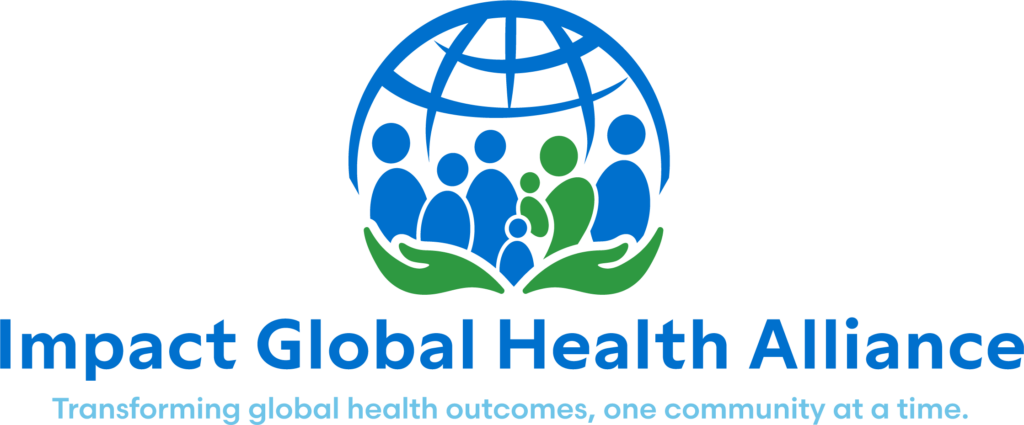
Community members at a Impact Global Health Alliance project site in Liberia – Ebola awareness. |
Brief history of Ebola
Since Ebola first surfaced in the Democratic Republic of the Congo in 1976, it has killed thousands of people. Doctors have yet to find a cure for the disease. In Liberia, the current Ebola crisis has overwhelmed the government. It has left the population anxiously waiting and thinking that the international community will discover a cure for the virus. This anxiety has unfortunately left many susceptible to believing false claims.
Reliance on spirituality for healing
An example of this comes from a woman named Yah, a resident of Nimba County where Impact Global Health Alliance Global works to stop the spread of Ebola. According to Yah, one day a young man named Nathan Sayegon came to her town. Nathan said that angels appeared to him, revealing the treatment of Ebola. Thus, Yah, whose husband and son suffer from the virus believes that her dream has come true.
More than one hundred people, gathered in Ganta on September 12, 2014 to drink herbs prepared by Nathan. People from Nimba, Bong and Lofa assembled on the soccer field in Diakehmen to receive the so-called magical cure. Finally, Nathan arrived along with his 12 “disciples” with singing and dancing. Disciples dipped patient’s cup into a container of boiled yellowish water. After which they told patients to drink only if they “trusted and believed in Jesus.”
Contested role of traditional healers
Unfortunately, a week later, the result was heartbreaking as there was an increased in death. In the city and its surrounding towns like Mongbein many people died, including Yah’s husband and son.
Now, the community stigmatizes Yah for fear that they will contract Ebola from her. She says that life has now become meaningless to her. She doesn’t know how she is going to live with such rejection from the community.
The role of traditional healers in combating Ebola is still greatly contested. The above account is an example of a reliance on spirituality and tradition that had devastating consequences. And unfortunately, it seems that some charismatic individuals may be quick to feed off the anxiety and concerns of the populace for their own fame.
Traditional healers play a very important role in many African communities. They are often a first-stop for maladies such as infections, broken bones, and headaches. People often stereotype traditional healers as “witch doctors” or voodoo workers. However, these healers typically use a combination of natural resources and spirituality. For example, they use natural resources – often roots, leaves, or herbs from which many modern medicines are derived – and spirituality to address physical maladies. These healers provide a culturally sensitive, accessible, and affordable option for medical treatment in communities where modern hospitals and clinics are often few and far between.
Equipping, Empowering and Capitalizing on traditional healers
In contrast to the above example of spiritual healing gone quite wrong, traditional healers are actually important tools in combating Ebola. They are often trusted and well-respected within communities. Thus, traditional healers that are equipped with accurate information regarding Ebola reach a much wider audience than foreign health workers.

Learning how to properly santize water to prevent the spread of disease |
Traditional healers are a key part of Impact Global Health Alliance Global’s success in integrating health messages and practices into communities. Instead of working outside the traditional health framework, Impact Global Health Alliance Global incorporates traditional healers from the beginning. We equip them with training so that they may better serve their fellow community members and provide important feedback to the project on the health status of the community. These traditional healers have been essential in all of our projects including the concentrated effort to combat Ebola. This is not only true for Impact Global Health Alliance, but also for other nonprofits working in the region.
Traditional leaders and healers as part of the solution
“Having people accept and understand information about Ebola is key to stopping this outbreak,” says Raul Paredes, deputy head of Ebola operations for the International Federation of Red Cross and Red Crescent Societies (IFRC) in Sierra Leone. “We cannot do it on our own, which is why it is critical to engage with community leaders, be they traditional healers or religious leaders.”
“Upon the outbreak of Ebola in Sierra Leone, when I got the information that you can get it through contact, I, as the head of the traditional healers in this district, have stopped treating patients,” says Fallah James, a traditional healer in Sierra Leone. “And I have been advising my colleagues that they should stop for now, until we get training and proper information about Ebola, so that it cannot infect so many people in our community.”
“Lessons learned from Ebola in Guinea can be applied to cholera, malaria or any other infectious disease in other parts of the world that rely on an oral tradition,” says Jean Marie Dangou, head of the World Health Organization (WHO) in Guinea.
The role of the traditional healer in modern public health is not likely to go away anytime soon. While an over-reliance on traditional and spiritual healing can certainly be harmful, ignoring local traditions and culture can be equally detrimental to the success of a health campaign.
 |
A community health worker gives a lesson on Ebola prevention
Stay connected with Impact Global Health Alliance by visiting our Website, Facebook page, YouTube, and join us in our effort to save lives of women and children in forgotten communities by fostering personable and sustainable health services. Take action Now
Written by Britnae Purdy, Impact Global Health Alliance intern, and our partners at the Nehnwaa Project, Liberia




